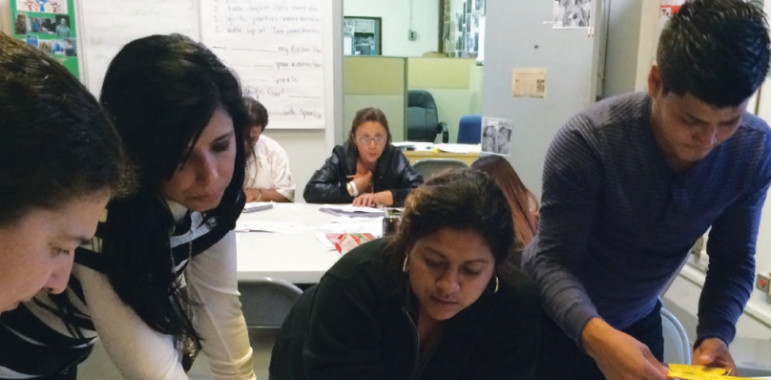
CPD
Since moving to New York from Cartagena, Colombia eight years ago, things haven’t been easy. Finding a way to put food on the table while navigating this enormous new city, particularly at first, was a huge challenge.
In my first years in the city, one of the biggest challenges was the language. I arrived here with the drive to get ahead and support my family, but I did not speak English.
When I would get lost and needed to ask people for directions, people didn’t always understand me. One day, I got lost in the subway. I didn’t know what to do, and I was far away from home, with no Spanish-speaking people in sight. I felt afraid, and I started to cry. I sat on a bench, tears in my eyes, for an hour until a police officer found me and offered to help.
Finding work was also a big challenge, too, because I could not communicate with many potential employers and customers. I almost landed my first job soon after arriving in New York City, but I lost it because I couldn’t speak English.
Things changed when I was able to find a free English class. I’ve been studying English at Make the Road New York for four years, and what I’ve learned has given me a sense of security when I need to communicate with people or ask questions. I feel much more comfortable now and less scared.
My English classes have helped me economically, too. For several years now, I’ve been a member of a worker-owned cleaning company called Pa’lante. Almost all of our customers are English-speakers, so knowing English is very important for communicating with them. Learning English has improved my ability to talk to my clients, which is good for me and good for our business.
For low-income immigrants like me, having free English classes available to us is important for helping us escape poverty and make the most of our potential. And, in one of the country’s most unequal states, it’s a key tool for fighting inequality.
As a new report by the Center for Popular Democracy and Make the Road New York shows, workers like me get better jobs and earn more when we’re able to learn English—which reduces the inequality in our City and State.
Adult literacy classes are also important for protecting workers’ rights. When some employers know that you don’t speak English, they assume that you don’t know what your rights are and take advantage of you. This happened to my husband, who was cheated of his overtime pay for years. The same thing happens to thousands of immigrant workers around the state, many of whom have their wages stolen by their employers. When we know English, we can better understand our rights and we’re more able to keep others from taking advantage of us.
For immigrants like me, New York’s investment in English classes is an investment for greater integration and for economic opportunity and equality. That’s why it’s key that New York increases funding for adult literacy programs like the one I attended.
Across New York, waiting lists for these classes are long, but funding has declined in recent years. Another recent study by the Center for An Urban Future found that state funding only produces enough seats to meet four percent of the need statewide.
We need both New York City and New York state to take on this challenge. New York State should increase its funding for these programs to $17.2 million, and New York City should dedicate $16 million to new investments in adult literacy programs.
At a time when New York’s leaders have become rightly preoccupied with addressing inequality, investing in classes like the one that I’ve taken is one of the most cost-effective ways to expand opportunity for New Yorkers and make New York a more equitable place for all.
Ruth López is a member of Make the Road New York, the largest grassroots community organization in New York offering services and organizing the immigrant community. Make the Road New York is an affiliate of Center for Popular Democracy. On Twitter: @maketheroadny.









2 thoughts on “CityViews: To Reduce Inequality, NY Must Spend More On English Classes”
Thank you for the article, the advice are really helpful! I was always learning English by myself: developed my vocabulary, learned grammar and watched the movies, but I got speaking practice having conversation with native speakers in the online school myenglishdom.com, by skype. The most important thing in learning English is big desire and motivation.
HOLY CRAP CITY LIMITS YOU FINALLY GET IT………….THE ONLY REAL DIFFERENCE BETWEEN A GOOD SCHOOL AND A FAILING ONE IS…..
THE GOOD SCHOOL DEMANDS YOU SPEAK ENGLISH WHEN YOU ENTER THE BUILDING….
ps that includes black people